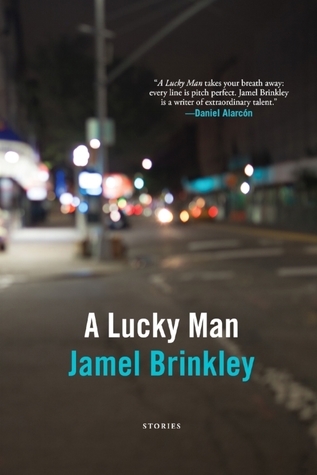 Review by E. Kirshe
Review by E. Kirshe
Jamal Brinkley’s debut book A Lucky Man is a collection of nine excellently written short stories that showcase a deeply thoughtful body of work.
The stories are set in Brooklyn and the South Bronx, the city serving as a backdrop for stories where complex familial relationships take center stage, as does black identity, and masculinity. These themes are all addressed through different stages of life: college aged, middle aged, and young boys serve as narrators throughout the collection.
In the first story, “No More than a Bubble,” two college-aged men, Columbia students, attend a party in Brooklyn. The narrator here jumps between the party, and how they fit into it, how he wants to be seen there especially by the women, and who he really is as he thinks of his parents. “We both preferred girls of a certain plumpness, with curves—in part, I think, because that’s what black guys are supposed to like. Liking them felt like a confirmation of possessing black blood, a way to stamp ourselves with authenticity.” It’s revealed he has a white Italian father and a black mother, something he reflects on through the course of the story as he and his friend follow two girls to their home, moving deeper and deeper into Brooklyn.
Authenticity or at least the performance of it is important in each story. Characters are often trying to be what they’re expected to be even when acknowledging (often fighting) who they are.
In the title story, “A Lucky Man,” Lincoln Murray, a security worker at an elite school, has to deal with getting older, the life he’s had versus the one he thinks he deserved as he fantasizes about beautiful women, while apparently having ignored the beautiful wife who has recently left him. A family man, the story begins with Lincoln lowkey stalking a woman he notices on the subway as he imagines everything about her life, and noticing every detail about her appearance- and grabbing a ‘covert’ photo on his phone. Brinkley writes this scene well- Lincoln is oblivious as the woman tries to avoid him. He has no idea that she likely knows what he did with his phone. We learn over the course of his day that he developed this habit a while ago. He later has to deal with the fallout of this, confronting why his wife left him, and waking up to the full realization of what he was doing. “Only two of the pictures remained on his phone now, the two from this morning. He deleted the one that had come out blurry. All that was left was the final one: the precision of the young woman’s glare, her disappointed mouth, the bolts of heat bright along her face. Her eyes were worse than those of the white woman in front of the school.”
Ty, the teenage narrator in “J’ouvert, 1996,” wants to prove that he’s ready to be a man. It’s the cusp of a coming of age story with a lot more elements of the child still showing through. He’s not happy about his mother’s new relationship, and overwhelmingly anxious about how he presents and how he can prove himself while not dealing well with not having a father, and not knowing who he should be. Despite being vulnerable and in turmoil, he’s very protective of his bizarre and sweet younger brother as he keeps him out all night to seek out the (much more adult) pre West Indian parade festival J’Ouvert.
There’s a lot of elements going on in each of these short stories. That’s another thing these works have in common: the themes are universal; the tale, specific. “Everything the Mouth Eats” takes a long look through the lives of two brothers, now somewhat estranged as they attend a Capoeira conference and confront their shared history. “I Happy Am” contrasts a young boy’s expansive imagination (first line: “when Freddy became a robot, a special map appeared in his mind”) against the very realistic trip he takes with his day camp to swim in a pool in the suburbs.
When someone is good at what they do they make it look easy. Brinkley’s work appears effortless in how it rolls along through to the end, lyrical in word choice. It’s clear that Brinkley pays attention to every sentence but it never feels overwrought. “She was tough, with wiry, muscular arms. But this afternoon, as she cleaned, she also concealed the woman I knew by making herself look soft. Pink plastic rollers filled her hair. The smell of dabbed-on Florida Water rose from her skin. Mike, her new boyfriend was coming over.” The searching and astute pieces don’t seem pretentious. There’s a sincerity that gives his characters relatability no matter where the reader may be coming from.
Though the volume consists of only nine stories, which makes for easy reading time-wise, I can’t possibly touch on everything I’d like, so go out and experience this fresh new author for yourself.
A Lucky Man is currently available from Graywolf Press and retailers
The Furious Gazelle received a copy of this book in exchange for an honest review.
Recent Comments